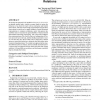Free Online Productivity Tools
i2Speak
i2Symbol
i2OCR
iTex2Img
iWeb2Print
iWeb2Shot
i2Type
iPdf2Split
iPdf2Merge
i2Bopomofo
i2Arabic
i2Style
i2Image
i2PDF
iLatex2Rtf
Sci2ools
68
Voted
ATAL
2015
Springer
2015
Springer
Learning By Observation Using Qualitative Spatial Relations
We present an approach to the problem of learning by observation in spatially-situated tasks, whereby an agent learns to imitate the behaviour of an observed expert with no interaction and limited observations. The form of knowledge representation used for these observations is crucial, and we apply Qualitative Spatial-Relational representations to compress continuous, metric state-spaces into symbolic states to maximise the generalisability of learned models and minimise knowledge engineering. Our system self-configures these representations of the world to discover configurations of features most relevant to the task, and thus build good predictive models. We then show how these models can be employed by situated agents to control their behaviour, closing the loop from observation to practical implementation. We evaluate our approach in the simulated RoboCup Soccer domain, and successfully demonstrate how a system using our approach closely mimics the behaviour of both synthetic (...
Related Content
| Added | 16 Apr 2016 |
| Updated | 16 Apr 2016 |
| Type | Journal |
| Year | 2015 |
| Where | ATAL |
| Authors | Jay Young, Nick Hawes |
Comments (0)

